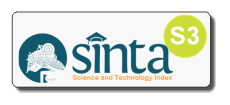Subjective Well-Being of Overseas Students at the State University of Malang
Abstract
Overseas students experience various new problems in the overseas environment. The problems experienced can be from loneliness to difficulty adapting. This research aimed to determine the differences in subjective well-being between overseas and local students based on age group, gender, and coping strategies used by overseas students at the State University of Malang. The research method used is a mixed method consisting of comparative quantitative methods with 54 respondents and phenomenological qualitative methods with four respondents. The instruments used are the Satisfaction With Life Scale (SWLS), with a reliability value of .948 and validity ranging from .903 to .975, and the Positive Affect Negative Affect Schedule (PANAS) scale, with a reliability value of .889 for positive affect and .905 for negative affect and has validity ranging from .445 to .838 for positive affect and .646 to .838 for negative affect. The results of the analysis show that there is no significant difference in subjective well-being between overseas students and local students (p equal to .272), and there is also no significant difference in terms of gender (p equal to .626) or age. Furthermore, the coping strategy used by overseas students to overcome their problems is to do their favorite activities and gather with their friends. The findings support that other factors can affect overseas students’ subjective well-being, including social support, social relationships, and technological developments.
Full Text:
PDFReferences
Akhtar, H. (2019). Evaluasi Properti Psikometris dan Perbandingan Model Pengukuran Konstruk Subjective Well-Being. Jurnal Psikologi, 18(1), 29–40. https://doi.org/10.14710/jp.18.1.29-40
Amati, V., Meggiolaro, S., Rivellini, G., & Zaccarin, S. (2018). Social Relations and Life Satisfaction: The Role of Friends. Genus, 74(1), 7. https://doi.org/10.1186/s41118-018-0032-z
Amelia, S. D. A., Pratikto, H., & Nainggolan, E. E. (2022). Dukungan Sosial dan Subjective Well-Being pada Mahasiswa Rantau. INNER: Journal of Psychological Research, 2(1), Article 1. https://aksiologi.org/index.php/inner/article/view/481
Asghar, M., Minichiello, A., & Iqbal, A. (2022). Perceived Factors Contributing to the Subjective Wellbeing of Undergraduate Engineering Students: An Exploratory Study. International Journal of Environmental Research and Public Health, 19(23), Article 23. https://doi.org/10.3390/ijerph192316284
Badan Pusat Statistik. (2021). Jumlah Perguruan Tinggi, Tenaga Pendidik dan Mahasiswa (Negeri dan Swasta) di Bawah Kementerian Riset, Teknologi dan Pendidikan Tinggi/Kementerian Pendidikan dan Kebudayaan Menurut Provinsi, 2021. BPS - Statistics Indonesia. https://www.bps.go.id/indikator/indikator/view_data_pub/0000/api_pub/cmdTdG5vU0IwKzBFR20rQnpuZEYzdz09/da_04/2
Bailey, T., & Phillips, L. (2015). The Influence of Motivation and Adaptation on Students’ Subjective Well-Being, Meaning in Life and Academic Performance. Higher Education Research & Development, 35, 1–16. https://doi.org/10.1080/07294360.2015.1087474
Bakrie, M. (2019). Menristekdikti Umumkan Klasterisasi Perguruan Tinggi Indonesia 2019, Fokuskan Hasil dari Perguruan Tinggi – LLDIKTI Wilayah XIII. LLDIKTI Wilayah XIII – Aceh. https://lldikti13.kemdikbud.go.id/2019/08/19/menristekdikti-umumkan-klasterisasi-perguruan-tinggi-indonesia-2019-fokuskan-hasil-dari-perguruan-tinggi/
Botha, B., Mostert, K., & Jacobs, M. (2019). Exploring Indicators of Subjective Well-Being for First-Year University Students. Journal of Psychology in Africa, 29(5), 480–490. https://doi.org/10.1080/14330237.2019.1665885
Boyatzis, R. E. (1998). Transforming Qualitative Information: Thematic Analysis and Code Development. Thousand Oaks: SAGE Publications, Inc.
Chi, W., Sang, Q., & Shu, S. (2020). The Relationship between College Students’ Major Intrinsic Motivation and Subjective Well-being: The Mediators of Major Engagement and Subjective Major Achievement. Psychological Development and Education, 36(4), 477–485. https://doi.org/10.16187/j.cnki.issn1001-4918.2020.04.11
Creswell, J. W. (2010). Research Design: Pendekatan Kualitatif, Kuantitatif, dan Mixed. Yogyakarta: Pustaka Pelajar.
Deaux, K. (1993). Reconstructing Social Identity. Personality and Social Psychology Bulletin, 19(1), 4–12. https://doi.org/10.1177/0146167293191001
Dellafrinida, A., & Harsono, Y. T. (2022). Hubungan Antara Self-Compassion dengan Resiliensi pada Mahasiswa Timur di Kota Malang. Seminar Nasional Psikologi Dan Ilmu Humaniora (SENAPIH), Article 0. http://conference.um.ac.id/index.php/psi/article/view/3153
Diener, E. (1984). Subjective Well-Being. Psychological Bulletin, 95(3), 542–575. https://doi.org/10.1037/0033-2909.95.3.542
Diener, E. (2000). Subjective Well-Being: The Science of Happiness and a Proposal for a National Index. American Psychologist, 55(1), 34–43. https://doi.org/10.1037/0003-066X.55.1.34
Diener, E. (2009). Subjective Well-Being. In E. Diener (Ed.), The Science of Well-Being: The Collected Works of Ed Diener (pp. 11–58). Dordrecht: Springer Netherlands. https://doi.org/10.1007/978-90-481-2350-6_2
Diener, E., Emmons, R. A., Larsen, R. J., & Griffin, S. (1985). The Satisfaction With Life Scale. Journal of Personality Assessment, 49(1), 71–75. https://doi.org/10.1207/s15327752jpa4901_13
Diener, E., Lucas, R. E., & Oishi, S. (2005). Subjective Well-Being: The Science of Happiness and Life Satisfaction. In C. R. Snyder & S. J. Lopez (Eds.), Handbook of Positive Psychology (2nd ed., pp. 63–73). New York: Oxford University Press.
Diener, E., Scollon, C. N., & Lucas, R. E. (2003). The Evolving Concept of Subjective Well-Being: The Multifaceted Nature of Happiness. Recent Advances in Psychology and Aging, 15, 187–219. https://doi.org/10.1016/S1566-3124(03)15007-9
Diener, E., & Seligman, M. E. P. (2002). Very Happy People. Psychological Science, 13(1), 81–84. https://doi.org/10.1111/1467-9280.00415
Diener, E., Suh, E. M., Lucas, R. E., & Smith, H. L. (1999). Subjective Well-Being: Three Decades of Progress. Psychological Bulletin, 125(2), 276–302. https://doi.org/10.1037/0033-2909.125.2.276
Finch, D. J., Hamilton, L. K., Baldwin, R., & Zehner, M. (2013). An Exploratory Study of Factors Affecting Undergraduate Employability. Education + Training, 55(7), 681–704. https://doi.org/10.1108/ET-07-2012-0077
Flaherty, S. C., & Sadler, L. S. (2011). A Review of Attachment Theory in the Context of Adolescent Parenting. Journal of Pediatric Health Care: Official Publication of National Association of Pediatric Nurse Associates & Practitioners, 25(2), 114–121. https://doi.org/10.1016/j.pedhc.2010.02.005
Francesconi, M. (2001). Determinants and Consequences of Promotions in Britain. Oxford Bulletin of Economics and Statistics, 63(3), 279–310. https://doi.org/10.1111/1468-0084.00222
Huang, Z., Zhang, L., Wang, J., Xu, L., Liu, Z., Wang, T., Guo, M., Xu, X., & Lu, H. (2021). Social Support and Subjective Well-Being Among Postgraduate Medical Students: The Mediating Role of Anxiety and the Moderating Role of Alcohol and Tobacco Use. Heliyon, 7(12). https://doi.org/10.1016/j.heliyon.2021.e08621
Hurlock, E. B. (1978). Child Development (6th ed.). Auckland: McGraw-Hill.
Kasser, T., & Ryan, R. M. (1996). Further Examining the American Dream: Differential Correlates of Intrinsic and Extrinsic Goals. Personality and Social Psychology Bulletin, 22(3), 280–287. https://doi.org/10.1177/0146167296223006
Kriyantono, R. (2006). Teknik Praktis Riset Komunikasi. Jakarta: PT Kencana Perdana.
Lazić, M., Jovanović, V., Gavrilov-Jerković, V., & Boyda, D. (2021). A Person-Centered Evaluation of Subjective Well-Being Using a Latent Profile Analysis: Associations With Negative Life Events, Distress, and Emotion Regulation Strategies. Stress and Health, 37(5), 962–972. https://doi.org/10.1002/smi.3056
Lee, J.-S., Koeske, G. F., & Sales, E. (2004). Social Support Buffering of Acculturative Stress: A Study of Mental Health Symptoms Among Korean International Students. International Journal of Intercultural Relations, 28(5), 399–414. https://doi.org/10.1016/j.ijintrel.2004.08.005
Littman-Ovadia, H., & Russo-Netzer, P. (2019). Prioritizing Positivity Across the Adult Lifespan: Initial Evidence for Differential Associations With Positive and Negative Emotions. Quality of Life Research: An International Journal of Quality of Life Aspects of Treatment, Care and Rehabilitation, 28(2), 411–420. https://doi.org/10.1007/s11136-018-2012-3
Liu, G., Li, S., & Kong, F. (2022). Association Between Social Support, Smartphone Usage and Loneliness Among the Migrant Elderly Following Children in Jinan, China: A Cross-Sectional Study. BMJ Open, 12(5), e060510. https://doi.org/10.1136/bmjopen-2021-060510
Mahasneh, A. M. (2022). The Relationship Between Subjective Well-Being and Social Support Among Jordanian University Students. Psychology in Russia: State of the Art, 15(2), 53–64. https://doi.org/10.11621/pir.2022.0204
Meisenberg, G., & Woodley, M. A. (2015). Gender Differences in Subjective Well-Being and Their Relationships With Gender Equality. Journal of Happiness Studies: An Interdisciplinary Forum on Subjective Well-Being, 16(6), 1539–1555. https://doi.org/10.1007/s10902-014-9577-5
Mónaco, E., Schoeps, K., & Montoya-Castilla, I. (2019). Attachment Styles and Well-Being in Adolescents: How Does Emotional Development Affect This Relationship? International Journal of Environmental Research and Public Health, 16(14), 2554. https://doi.org/10.3390/ijerph16142554
Newsom, J. T., & Schulz, R. (1996). Social Support as a Mediator in the Relation Between Functional Status and Quality of Life in Older Adults. Psychology and Aging, 11(1), 34–44. https://doi.org/10.1037/0882-7974.11.1.34
Niam, E. K. (2009). Koping terhadap Stres pada Mahasiswa Luar Jawa yang Mengalami Culture Shock di Universitas Muhammadiyah Surakarta. Indigenous: Jurnal Ilmiah Psikologi, 11(1), Article 1. https://doi.org/10.23917/indigenous.v11i1.1615
Nureffa, D. A. A., & Khasanah, A. N. (2022). Gambaran Subjective Well Being Mahasiswa Kedokteran Kota Bandung. Bandung Conference Series: Psychology Science, 2(2), Article 2. https://doi.org/10.29313/bcsps.v2i3.3099
Özdogan, A. Ç. (2021). Subjective Well-Being and Social-Emotional Loneliness of University Students: The Mediating Effect of the Meaning of Life. Journal of Pedagogical Research, 5(1), 18–30.
Perguruan Tinggi. (n.d.). Pemerintah Kota Malang. Retrieved August 9, 2023, from https://malangkota.go.id/fasilitas-daerah/pendidikan/perguruan-tinggi/
Priyatno, D. (2016). Belajar Alat Analisis Data dan Cara Pengolahannya dengan SPSS. Yogyakarta: Gava Media.
Puteri, I. A. W. (2020). Asertivitas dan Subjective Well-Being pada Mahasiswa di Masa Pandemi COVID-19. Jurnal Psikologi Malahayati, 2(2), Article 2. https://doi.org/10.33024/jpm.v2i2.3066
Russell, D., Peplau, L. A., & Cutrona, C. E. (1980). The Revised UCLA Loneliness Scale: Concurrent and Discriminant Validity Evidence. Journal of Personality and Social Psychology, 39(3), 472–480. https://doi.org/10.1037/0022-3514.39.3.472
Santrock, J. W. (2006). Life-Span Developmental Psychology. New York: McGraw-Hill Companies, Inc.
Santrock, J. W. (2015). Adolescence (16th ed.). New York: McGraw Hill Education.
Singh, S., Karakoç, E., & Blais, A. (2012). Differentiating Winners: How Elections Affect Satisfaction With Democracy. Electoral Studies, 31(1), 201–211. https://doi.org/10.1016/j.electstud.2011.11.001
Statistik UM. (n.d.). Statistik UM. Retrieved August 9, 2023, from https://statistik.um.ac.id/
Sugiyono. (2015). Metode Penelitian Kombinasi (Mix Methods). Bandung: Alfabeta.
Tifferet, S. (2020). Gender Differences in Social Support on Social Network Sites: A Meta-Analysis. Cyberpsychology, Behavior and Social Networking, 23(4), 199–209. https://doi.org/10.1089/cyber.2019.0516
Ward, C. A., Bochner, S., & Furnham, A. (2001). The Psychology of Culture Shock. East Sussex: Routledge.
Watson, D., Clark, L. A., & Tellegen, A. (1988). Development and Validation of Brief Measures of Positive and Negative Affect: The PANAS Scales. Journal of Personality and Social Psychology, 54(6), 1063–1070. https://doi.org/10.1037/0022-3514.54.6.1063
DOI: http://dx.doi.org/10.17977/um023v12i12023p144-162
Refbacks
Copyright (c) 2023 Jurnal Sains Psikologi

This work is licensed under a Creative Commons Attribution 4.0 International License.
Reference Manager :
|
Aliansi:
Plagiarism Checker :
This work is licensed under a Creative Commons Attribution 4.0 International License.



1.png)








